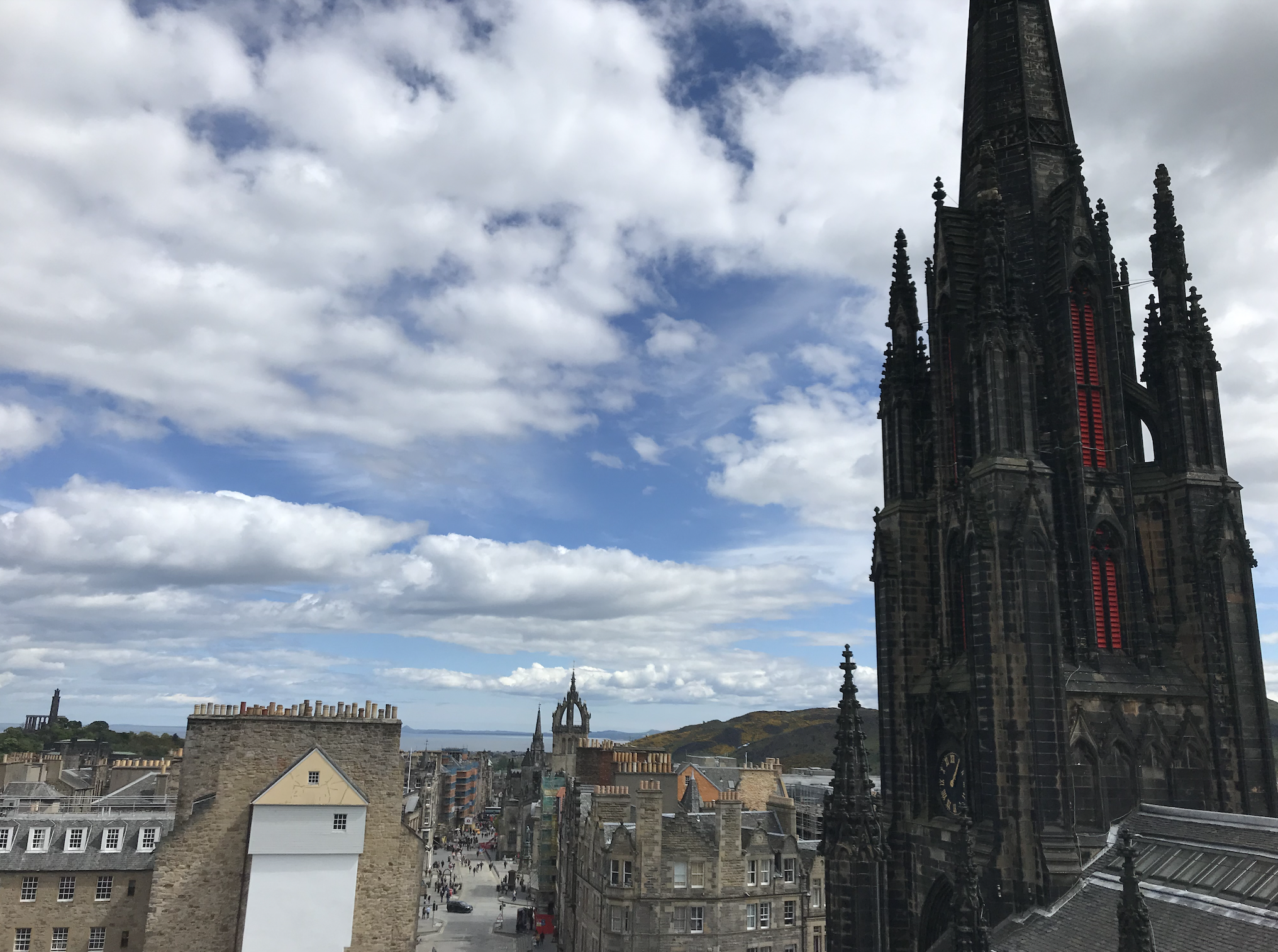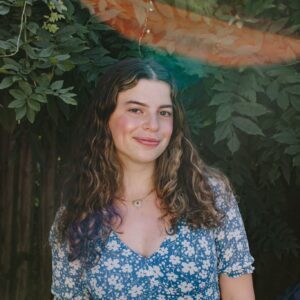The thing I most need to write about is the thing I never can. This will have to suffice instead.
The question of what to write about plagues me constantly, to the point where I never really end up writing anything. And besides, I know I cannot write about the thing that I really need to. No, I will not give any hints, those will simply give it away.
I spent my summer in various European cities. Sleeping through walking tours in London! Dragging my mom to the Kafka house in Prague! Post-Tisha B’Av pastries and Jeopardy in the south of France! I posted pictures that were the right balance of landscape, museum portraits, candids with friends (everyone must know I have friends!) and the occasionally tasteful photo of myself where I don’t look good. Trust me, it’s a part of the aesthetic. It’s important to present a good front in order to distract from the fact that up until a week before I left I was fairly certain I would kill myself before I got to experience my girl-about-town summer. I don’t know who exactly I was trying to distract. Everyone, really.
The main chunk of my summer was spent at a non-denominational yeshiva in Edinburgh. Every morning, I would haul ass up the steepest hill imaginable to New College at the University of Edinburgh where I would spend 9 hours shivering in our drafty but historic Beit Midrash. One morning as I prayed in the courtyard, bustling groups of tourists took photos of the John Knox statue, presumably with me in frame. The program was small and intense and a sort of haven. Despite the median age leaning heavily towards millennials, I made deep connections with everyone there. We would sing together on our walk home from the club at 4 am while bafflingly, the sun was rising, and make Instagram collages of Americans trying different flavored Digestives for the first time. During our orientation, another member of the program was telling me how exciting it all was that the organizers (a group of 20 something year olds) managed to make the program happen. There was almost no funding and little publicity. This participant told me, giddily, that it was the type of program that took such passion from everyone and would almost definitely not make it past a few years. To them, that was part of what made it so special. At the time, I found this sentiment deeply upsetting, but I’ve come to find the truth in it. Regardless of whether or not the institution itself will survive, the space we experienced this summer is dead. Yes, it lives on in memory and altered the makeup of our souls or whatever, but what was created there can never be replicated. Even if we somehow managed to get every member back into that living room in Edinburgh, singing the same songs, it will never feel the same. We will no longer have those same strings of connection, varying in strength but never tenderness, weaving between us.
That which we can never return to can bring comfort as well as waves upon waves of pain. While in Edinburgh, a friend of mine led a session on the connection between transness and the Jewish lens of exile. The Torah outlines a place – again, both physical and meta – that we must mourn, as a sacred commandment, but which we can never come back to. Even if we do somehow welcome the Messiah and rebuild the temple, it will never be what it once was. The scars of exile will remain. We may have never even been there in the first place but we still mourn, wiping the tears of our ancestors from our cheeks while we voraciously watch The Great British Bake Off on Tisha B’Av.
One day, we were asked to go around and say what we pictured when we imagined the Torah. People gave examples like the ocean and a photo developing in a dark room. There was an emphasis on sacredness and vastness, a text with endless possibilities of interpretation that we are meant to occupy our whole lives trying to decipher. All I could think to say was that I imagined my ex boyfriend. When I said this people laughed but I really hadn’t meant it to be funny. It is blasphemous, I know, to admit that much like my ex, I see the Torah as neither sacred nor worthy of my attention any longer. No more blasphemous than showing up to Yom Kippur with hickies on my neck and my phone in my pocket, but truthfully I have something far more blasphemous to say. I do not think the Torah is a text I need to occupy myself with. Not only do I think it’s quite frankly not that interesting (sorry), but it embodies that same arrogant, biting, merciless swathe of space as my ex does. For most of our relationship, it felt like he owned the Torah. The way he would talk down to me, tell me it wasn’t my fault I didn’t properly understand halacha, it was the fault of Orthodox education for not prioritizing women’s education. He’s an ally! So even though I was going braless to my Hasidic classes and my teacher told me I had a “Talmud brain,” it was still him I saw when I visualized the Torah.
How do we continue to exist peacefully in this world when we know that nothing will ever be the same as it once was? When my grandmother was visiting, she declared that I was living my dreams. I quickly answered that I wasn’t, but on the surface level I certainly am. I spent my summer lapping up errant sunlight in the valleys of Holyrood Park at 8 PM and swimming circles beneath the sun, gathering relief from the Mediterranean and the presence of two astonishingly lovely human beings. Nothing can ever really be the same, I don’t think. After experiencing a sorrow that I was convinced meant the end of my life, I cannot quite escape the enduring pangs of that suffering.
That does not mean there isn’t joy. There was a night in early July that stands out as particularly telling of the multitude of emotions I now feel I carry within myself. We had cocktails after class and I had about an hour to kill before I led the Edinburgh Jewish community in learning Sylvia Plath’s “Edge” in conjunction with the traditional Jewish song “A Woman of Valor,” a vignette taken from Proverbs. I was laying in my dorm room bed, suddenly remembering that it was one of my favorite people in the world’s birthday. As I hastily assembled a birthday post – one that was far more gooey than my usual work, but purely genuine – and scaled the hilly streets, I felt a sense of complete awareness that I was alive. The Lumineers were playing at Edinburgh Castle that night and the music was wafting throughout the city. Unlike the moments when I finally realize goals I had always had, this moment wasn’t something I could have anticipated experiencing. It wasn’t the physical manifestation of previous hopes – a form of return in itself.
When planning how I would present these two texts together, I knew that as was usually the case, I would not really be able to say what I meant. The argument I presented was that “Edge,” could serve as a kind of epilogue to “A Woman of Valor,” but no, not in that way! It’s not sad! Death doesn’t have to be sad! But of course it’s sad. There is always a look people give me when I say I study Plath, the look that implies okay, we get it, you’re a sad girl, she was a sad girl. In a way, yes and yes, but as always, more. I would lie if I said I didn’t feel more connected to Plath than any text I learnt in yeshiva and I wouldn’t want to change that. I feel a sense of ownership over my copy of Ariel that I will never feel over the Talmud I stole from Hillel. There is no non-cliche way to say that Plath sees me. I see “Edge,” as an unsettling but accurate and satisfying ending to “A Woman of Valor,” in a way that I don’t see it as a satisfying ending to Plath’s life. There was no inevitably to her death. The pain comes and goes; the periods of joy in no way make up for the brutal sadness but the same goes for the other way around. Every feeling I have ever felt I will feel once again. That is the most terrifying and comforting sentence I can offer, to myself and to her.

